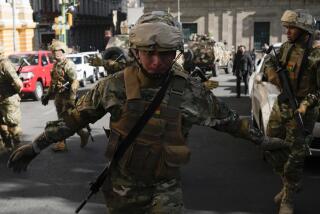State of Siege Proclaimed in Argentina : Alfonsin Acts to End Violence Seen Aimed at Disrupting Elections
- Share via
BUENOS AIRES — Argentine President Raul Alfonsin decreed a limited, 60-day state of siege Friday to combat what his government called “new and growing acts of violence.”
In announcing the emergency action, a modified form of martial law that will allow the government to make arrests without pressing formal charges, Interior Minister Antonio Troccoli cited “the persistence of growing violence,” particularly a wave of bombings believed to be aimed at disrupting congressional elections scheduled for Nov. 3
The decree seemed to be an attempt to resolve a dispute over the government’s right to hold 12 political rightists, six of them army officers, whom it arrested Tuesday in connection with the bombings. The decree also reaffirmed civilian authority over the restive armed forces.
The decree, signed by Alfonsin, ordered a nationwide state of siege but stressed that there will be continued “full observance of constitutional rights and guarantees, especially those necessary” to carry out the congressional elections.
In a second decree, the government again ordered the detention for 60 days of the 12 rightists, accused of conspiring in a small-scale wave of bombings and intimidations intended to destabilize the government. On Thursday, a federal judge had ordered the release of one of the 12, a retired army colonel, saying that his original arrest was unconstitutional in the absence of a state of siege.
Quoting Argentine intelligence services, one Buenos Aires newspaper Friday said the government believes that at least 200 persons are involved in the destabilization attempt.
The bombings have persisted. A weekend house rented by Interior Minister Troccoli on the outskirts of the capital was bombed after midnight Wednesday. On Thursday, 49 primary schools in Buenos Aires received bomb threats. In the past month, about a dozen bombs have exploded without injuring anyone, a number of them at public places and building complexes frequented by military officers.
The decree establishing the state of siege denounced “the indiscriminate placement of explosive devices, threats and intimidations . . . which doubtless form an attempt at destabilization that threatens constitutional government.”
Political Expectations
When it announced the arrests of the six army officers and six civilians Monday, the government charged that they were attempting to destroy public confidence before the congressional elections, which Alfonsin’s center-left Radical Civic Union party expects to win.
Placement of the bombs, the government charged, was intended to give the impression that Marxist guerrillas are again active in Argentina, thereby undermining government prestige and credibility.
The six civilians ordered arrested are extreme nationalists closely linked to the most conservative elements within the Argentine army.
Argentine analysts believe that the objective of the destabilization effort is not to provoke a coup but to influence retirements and promotions within the armed forces to favor hard-liners hostile to Alfonsin.
Successive military juntas ruled Argentina as a dictatorship between 1976 and Alfonsin’s election in 1983, when the armed forces, in disgrace over Argentina’s defeat by Britain in the 1982 Falkland Islands war, gave up power.
Civilian Control
During his 22 months in office, Alfonsin has moved resolutely to bring the armed forces, the arbiters of Argentine political life for half a century, under civilian control.
He retired scores of top armed forces officers, slashed military spending and insisted that the armed forces place on trial former commanders accused of human rights abuses. When military courts showed no disposition to act, Alfonsin ordered the human rights trial of nine former junta members, including three former presidents, by a civilian court.
During a six-month trial that ended Monday, they were accused of the kidnap, torture and murder of an estimated 9,000 people between 1976 and 1980. The defendants have denounced the charges against them and challenged the government’s right to try them. In a statement Friday, former President Jorge R. Videla, one of the defendants, charged that “this trial has sown the seeds of hate, discord and resentment, seeking to smear military institutions by casting them in the same light as subversive organizations.”
The trial stoked hostilities toward Alfonsin within the armed forces, whose former leaders say that the harsh measures they took were necessary to put down Marxist guerrilla action. There are also widespread reports of discontent among younger officers with Gen. Hector Rios Ernu, the current army commander who is seen by critics as not having defended the institution as vigorously as his predecessors.
Colonel’s Rearrest
On Friday, the army said that the six officers accused of attempting to destabilize the government will be tried by a military court. Alejandro Arias Duval, the retired colonel who was released Thursday by a judge who ruled that his arrest was illegal, reported for work as usual Friday as a contract employee of an army intelligence unit. He was again taken into custody after imposition of the state of siege.
By the government’s account, the campaign of violence was orchestrated by cashiered former Gen. Guillermo Suarez Mason, who fled the country to avoid prosecution on human rights and corruption charges.
More to Read
Sign up for Essential California
The most important California stories and recommendations in your inbox every morning.
You may occasionally receive promotional content from the Los Angeles Times.










